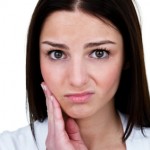TMJ Symptoms In Children
 TMJ refers to the Temporomandibular Joint. It indicates the temple area and the mandible or lower jaw. TMJ is the medical condition which affects the joint that connects the lower jaw to the skull. If you place your fingers lightly in front of your ear and open your mouth, you can feel the ends of the lower jaw. These rounded ends move along the socket of the temporal bone which encompasses the temple and has within it the inner ear. This disorder is also called TMD.
TMJ refers to the Temporomandibular Joint. It indicates the temple area and the mandible or lower jaw. TMJ is the medical condition which affects the joint that connects the lower jaw to the skull. If you place your fingers lightly in front of your ear and open your mouth, you can feel the ends of the lower jaw. These rounded ends move along the socket of the temporal bone which encompasses the temple and has within it the inner ear. This disorder is also called TMD.
TMJ or jaw pain symptoms in children
This malady can affect children at any age but it is more prevalent in teenagers and girls. It starts with soreness in the jaw but at times this pain becomes intense and lingers. Chewing becomes difficult and even smiling and breathing cause an increase in the pain. Treatment is required for this condition. Other common symptoms are
- Clicking or popping sound when the mouth is opened or closed. If there are no other symptoms, treatment may not be prescribed.
- Pain around the ear, jaw joints, neck and shoulders. There may be pain in the muscles of the face or muscle spasm.
- Talking, yawning and chewing causes pain.
- Biting or chewing food becomes a difficult task.
- The patient experiences dizziness and headaches.
- The ear is effected with pain and ringing in the ears. There may be loss of hearing.
- In extreme case the jaws may lock, either with the mouth open or shut.
TMJ children causes
No one knows for sure what causes TMJ disorders but there are many factors which are believed to contribute to the disorder. When the joint is over worked, wear and tear in it increases. In this particular joint a disc is worn out or moves out of place. The bite, or the way the upper and lower teeth align, gets changed with grinding and clenching of teeth. This affects the muscles which are used for chewing food. Some children are not even aware that they are clenching their teeth or grind them while sleeping.
Stress is a major factor which causes children to tighten their jaw muscles or clench their teeth inadvertently. Those most likely to suffer from TMJ are the people who have dental problems of bad bite, muscle problems, joint problems like arthritis or those who have suffered a facial or jaw injury.
A few precautions can lessen the incidence of TMJ. A child should be made aware that he clenches or grinds his teeth so that he is able to control the activity. He should be told to monitor this fact when he is under stress, upset or angry, may be during an exam or when he has quarreled with someone. Breathing exercises can be taught to let the child relax. Physical exercise and games can dissipate nervous energy to a great extent.
Treatment
The child should be taken to a dentist as soon as these symptoms are noticed. The dentist will order X-rays, CT scan or MRI after examining the child. If the child’s jaw is locked, open or shut, an oral surgeon should be consulted immediately or the child taken to the emergency room of the hospital.
Mild cases of TMJ disorders can be treated by giving the jaw rest for a few days. The child should be given soft foods which do not tax the jaws. Chewing gum or opening the mouth wide needs to be avoided. The child should be asked to relax and not clench or grind his teeth. Heat packs or ice packs on the side of the face will alleviate pain to some extent.
Some children grind and clench their teeth at night while they are sleeping. To reduce this unconscious aggravation a dentist will make a bite plate for the patient which is to be worn at night. This will absorb the pressure of the teeth. If the teeth are not aligned properly, then the bite will cause TMJ disorder. A dentist will do dental work to correct it or will fit braces. Medicine will be given for relieving pain and relaxing facial muscles.
Depending upon the diagnosis treatment will be given. If the jaw is locked, the child will be sedated and the jaw manipulated till it can be easily opened and closed. In extreme cases, when all these treatments are ineffective, then surgery has to be resorted to in order to repair the damaged tissue of the joint. Surgery is usually not required in TMJ disorders.